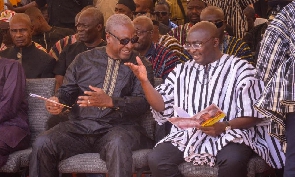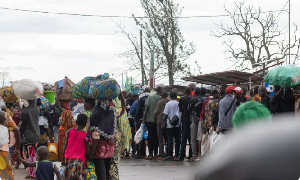The Gulf of Mexico oil spill also referred to as the Deepwater Horizon oil spill or the Macondo blowout has not only proved a disaster for BP and the United States but has send worrying signals of the apparent dangers associated with oil exploitation and production to other oil-rich countries. Being the biggest oil spill in the history of the United States even surpassing the Exxon Valdez oil spill which occurred in Alaska in 1989, the disaster has not only drawn wild international concerns but has brought considerable costs (economic and financial) to companies concern.
Let us examine whether or not there would be effects of the Deepwater Horizon oil spill on the development of the Jubilee Field and other upstream and downstream activities. You should now change your thoughts if you think that the BP blowout is the concern of only the United States. There is a hidden (that would in less than no time be an open fact) interplay between the blow out and the development of Ghana’s oil and gas industry. There are explicitly direct effects that the economy of Ghana would suffer. There is a crucial question that awaits an answer. What is the link between the BP oil disaster and the development of Ghana’s oil industry? Should Ghana care about the growing surreal state of the spill?
It is important to note that the consequences of the BP oil disaster will go far beyond the Gulf of Mexico and into the jurisdiction of West Africa. And definitely, Ghana is no exception in this regard. This and others as a matter of fact makes the spill worthy of consideration in the country.
THE CASE DEMYSTIFIED
The Macondo well in the Gulf of Mexico is owned by BP and other partners including Anadarko Petroleum Corporation, which owns a 25 percent stake and Mitsui Oil Exploration Company which also owns 10 percent stake. Anadarko is one of the leading companies that is playing key role in the Jubilee field. In the West Cape Three Points block, Anadarko owns 30.875 percent working interest and as well 18 percent stake in Deep Water Tano. However, the United States deepwater Gulf of Mexico and Algeria represent the majority of the company’s proven reserves and production. It also has exploration and/or production in Alaska, China, Brazil, Indonesia, Mozambique and several other countries.
The Texas-based oil company which is well known for its deep water exploration experience considers Jubilee as one of its sanctioned mega projects including Caesar/Tonga and El Merk. This has therefore necessitated the installation of subsea infrastructure and equipment which is under way at the Jubilee field offshore Ghana.
By virtue of Anadarko’s 25 percent working interest in BP’s Macondo Prospect, it is reported that its finances have been rocked by the Deepwater Horizon oil spill. Information obtained by TPMMuckraker indicates explicitly that BP has billed Anadarko more than $272 million for its share of cleanup and response costs in the Gulf. (Source: Exclusive: BP bills Anadarko $272 Million in Gulf Spill Response, Slajda, Rachel TPMMuckraker June 30, 2010, 2:37 PM. Retrieved on July 4, 2010.)
Analysts at credit research firm CreditSights in a report indicate that assuming Anardarko is held liable for its 25 percent ownership in the well the company may need to pay around $7.3 billion in the next few years. This figure among other things includes the company’s potential share of cleaning up the spill, its contribution to the $20 billion claims fund announced by BP and the US government and potential fines and penalties.
CreditSights again indicates that Anadarko could fund more than 90 percent of this cost within 18 months by using the company’s $3.7 billion cash balance, cutting capital spending over the period by 10 percent, or $825 million, suspending its dividend for savings of $370 million and undertaking $2 billion in assets sales.
Though Anadarko publicly suggested this month that it won’t pay for costs associated, claiming in a statement that BP is guilty of gross negligence or willful misconduct, it is important to assert that the impact of this awful development will not elude the Jubilee Field with regard to infrastructure provisions and general development to facilitate commercial production. It is known that under the joint operating agreement with BP, Anadarko must pay its portion of costs related to any incident--unless that incident was caused by its partner’s (BP) gross negligence or willful misconduct.
With these huge costs to be borne by Anadarko, what then is expected to be the state of the Jubilee field especially when Anadarko plays a leading role in oil production? Will development of the field be stalled when one (Anadarko) of the main four companies is reportedly about losing its investment grade status?
DEVELOPING THE JUBILEE FIELD
It is a known fact that developing an offshore field such as Jubilee takes several years, the engagement of several companies and numerous contractors, and several billions of dollars in financing. In mid-to late 2008, the four main companies in the field - Kosmos, Tullow, Anadarko, and the GNPC negotiated a unitization agreement and worked together to present a field development plan to the Ghanaian government for approval. The field development plan though was not approved by the end of 2008, has been sanctioned by the Ministry of Energy in the last quarter of 2009. Is the field development plan going to achieve its intended objectives?
As it’s always expected to be, there is secrecy that has shrouded the contents of the plan. Nonetheless, according to the Report by Oxfam America and ISODEC titled “Ghana’s big test: Oil’s challenge to democratic development”, field development plans, based on data about the field and engineering studies, may include: details on how the development and production of the field will be financed; details on the drilling and completion of wells and the production, storage, transportation and delivery facilities for petroleum, including a timetable; method for disposal/use of associated gas; onshore installations required; production profiles for oil and gas from the field; economic feasibility studies of alternative methods of developing the field; measures to be taken up to protect the environment; and proposals or requirements for procurement of staff, goods, and services from the national market.
The fast-track field development plan, with the start of commercial production slated for just over three years from the date of discovery is well dependent on finance. These arguments are to give a limelight to the fact that financing capabilities of these four companies would determine the extent and dictate the pace of development of the field to enhance early and efficient commercial production. With BP passing the buck to oil well partners including Anadarko, will Anadarko have the capacity to finance infrastructure and as such meet its obligations in the unitization agreement?
Anadarko will definitely be in trouble financially if they have to carry their share of the cost around the blow out. They may be compelled to slow down investments in Ghana. This justifies the fact that there is a direct link in the BP oil disaster and the Jubilee field development. The blow out can therefore have direct implications for the development of Ghana’s oil and gas discoveries. What becomes of the company’s installation of subsea infrastructure and equipments?
If BP is found to be guilty of gross negligence, then Anadarko and Mitsui will be absolved of responsibility. This would then serve to be good news for Ghana. If otherwise, then the above arguments will hold true. Even besides the fact that Anadarko may be financially incapacitated, the spill should inform the government of the need to make strong provisions for environmental mitigation measures. The costs of environmental damages are immeasurable and irreversible and as such no amount of money can offset ravaging impacts.
In a different perspective, the Gulf of Mexico oil spill has sparked geographic shift where Africa is set to receive even more attention from foreign bidders. With increased pressure on its oil blocks coupled with ostensibly weak regulations and institutions, can Ghana elude the fate of Gulf of Mexico?
At the same time, it is worth asking what is the government doing to ensure that oil companies can pay their claims if a spill happens? Oil spill is inevitable. Therefore, only strong legal and regulatory frameworks and institutions can sustain the country in achieving its oil dreams supposed there is a spill. Will the regulations that would not be a year old have the capacity to monitor and control activities of oil companies when production commence?
In essence, the Macondo spill effect will ostensibly surface on the land with not only uncontrollable but misguided expectations for oil gains.
CONCLUSION
The US National Intelligence Council has reported that by 2015, America will receive over 25 percent of its oil from offshore drilling in West Africa. This explains the pressure that is about to come to Ghana and behooves the country to prepare adequately in dealing with issues in the most sensitive sector of the economy. With the supposedly anticipated troubled finances of Anadarko in addition to the jostling for the working interest of Kosmos by ExxonMobil and GNPC, should the country expect an early, efficient and transparent development of the Jubilee Field with its associated oil and gas activities? These and many other pertinent issues should remain a priority for the country and not the naming of the country’s oil in international market.
The potentials of the Jubilee Field should not be sacrificed on the altar of “eager and rush for cash” or “corruption” but developing the field in an integrative and sustainable manner. All the companies involved should operate to ensure coordinated development of oil and gas activities for the country. The government (GNPC) and the companies should keep to well completions, field extensions as well as large infrastructure efforts like highways, pipelines, to mention but few. But the question still remains that are Anadarko’s finances going to be crippled to the detriment of the development of Jubilee Field? The Deepwater Horizon oil spill is a disaster that is “outside the box”. It is my fervent hope that BP recovers from this crisis to impress its known good operation standards in the oil and gas sector in the world.
The author, Stephen Yeboah is a freelance writer and the National Co-ordinator for Osagyefo Network for Rural Development (OSNERD), an NGO based in Kumasi [email: stephenyeboah110@yahoo.com]
* The opinions expressed and arguments employed in this article are the sole responsibility of the author and do not necessarily reflect those of OSNERD.
Opinions of Sunday, 11 July 2010
Columnist: Yeboah, Stephen














